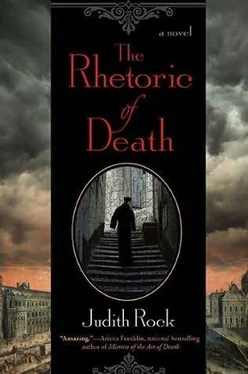Judith Rock - The Rhetoric of Death
Здесь есть возможность читать онлайн «Judith Rock - The Rhetoric of Death» весь текст электронной книги совершенно бесплатно (целиком полную версию без сокращений). В некоторых случаях можно слушать аудио, скачать через торрент в формате fb2 и присутствует краткое содержание. Жанр: Исторический детектив, на английском языке. Описание произведения, (предисловие) а так же отзывы посетителей доступны на портале библиотеки ЛибКат.
- Название:The Rhetoric of Death
- Автор:
- Жанр:
- Год:неизвестен
- ISBN:нет данных
- Рейтинг книги:3 / 5. Голосов: 1
-
Избранное:Добавить в избранное
- Отзывы:
-
Ваша оценка:
- 60
- 1
- 2
- 3
- 4
- 5
The Rhetoric of Death: краткое содержание, описание и аннотация
Предлагаем к чтению аннотацию, описание, краткое содержание или предисловие (зависит от того, что написал сам автор книги «The Rhetoric of Death»). Если вы не нашли необходимую информацию о книге — напишите в комментариях, мы постараемся отыскать её.
The Rhetoric of Death — читать онлайн бесплатно полную книгу (весь текст) целиком
Ниже представлен текст книги, разбитый по страницам. Система сохранения места последней прочитанной страницы, позволяет с удобством читать онлайн бесплатно книгу «The Rhetoric of Death», без необходимости каждый раз заново искать на чём Вы остановились. Поставьте закладку, и сможете в любой момент перейти на страницу, на которой закончили чтение.
Интервал:
Закладка:
“Why do you want this boy in a yellow shirt, Jesuit?” one of the students drawled, recognizing the distinctive Jesuit cassock, which wrapped to the side instead of buttoning. “Good luck to him, he’s well away from your lies.”
“And what are you doing out without your priest hat?” another taunted.
Charles whirled as the second speaker plucked off his skullcap from behind and tossed it to one of his friends, who threw it into the gutter in the middle of the street. Hands twitching with the urge to thrash the lot of them, Charles planted his feet and locked eyes with each boy in turn. They seemed to register his height and breadth of shoulder for the first time and drew closer together.
“Perhaps you didn’t hear me, messieurs,” Charles said pleasantly. “Did any of you see a boy in a yellow shirt just now?”
They shook their heads.
“Then I thank you for your help, messieurs,” Charles said, sounding as though they were all in someone’s salon and still showing his teeth in what might be taken for a smile by the unwary.
The boys walked quickly away, casting apprehensive glances over their shoulders. Charles went to see if his new skullcap was salvageable. It was true that he shouldn’t be in the street without his hat, but he hadn’t planned on chasing a runaway Hercules out into Paris. Sadly, he surveyed his new skullcap, which rested like a funerary offering on a very dead cat and definitely was not salvageable. He left it where it was and started back to the college, zig-zagging through the traffic and peering down side streets and into shops in case Philippe was hiding somewhere. He guessed, though, that the boy was long gone, absorbed into the melee of the streets.
The cacophony that was Paris traffic-voices, feet, hooves, rattling wheels, barking dogs-beat against Charles’s ears as he walked. Everyone and everything shared the square-cobbled pavement and shouting matches erupted constantly, everyone being certain that the bon Dieu had put the next open foot of pavement there for him or her alone. Charles wove his way among the high-wheeled, painted carriages, students in short gowns, white-, black-, and brown-robed clerics on foot and on mules, professors lost in private fogs of thought, coiffed and basket-laden serving girls, the scavenging dogs, ragged street porters with loaded wooden carrying frames on their backs, and bewigged gentlemen whose ice-white linen gleamed against the jewel colors of their skirted coats as they swept iron-tipped canes before them to clear a path. Over it all, bawling street vendors cried everything from “brooms, brooms,” to “Portugal, Portugal,” which sounded so warmly exotic but meant shriveled little oranges.
Charles wondered why on earth Philippe had run. Running away from the college was not a light offense. Nor was shoving a professor to the ground in the process, though now that his temper had cooled, Charles didn’t intend to report that. But even without that black mark, Philippe had almost certainly lost his place in the ballet, if not in the college. Charles had seen him watching the classroom windows before he vanished, seen that his mind was anywhere but on his dancing. Had something-or someone-in the courtyard drawn him away? Jouvancy had said that the boy was bright. But he was also sixteen, and sixteen, whether bright or dull, wasn’t known for its wisdom.
Charles rang the bell at the college’s small postern door to the right of the formal entrance and then stepped back to look up at the carved and painted tympanum above the tall double doors. When the Jesuits opened their Paris college more than a century ago, they’d called it the College of Clermont. Now the tympanum said “Collegium Magni Ludo,” The College of Louis the Great, and was topped by a crown and the royal fleur de lis, which proclaimed King Louis XIV’s patronage.
A lay brother opened the postern and Charles hurried through the echoing stone-vaulted passage to the Cour d’honneur, toward the sound of Beauchamps’s violin. The dancing master was still driving the harried, and now heroless, dancers toward the mythical Hesperides. With a sigh for the ephemeral allure of earthly paradises, Charles went to report his failure to find Philippe Doute.
Chapter 5
When Charles finally gained the quiet of his chamber that night, he was too tired even to look out the window at Paris. He stripped down to his shirt, fell into bed, and stretched out, past caring whether his feet hung over the edge. He fell asleep between one thought and the next, to dream that he was dancing a gigue while Pernelle played Beauchamps’s little fiddle.
When he woke, he was curled into a tight ball and the day’s first light was gray around the shutters. He said the waking prayers, yawned his way to the window to open shutters and casement, and leaned out. Across St. Jacques, the dome capping the university’s new church was just visible in the growing light. The air was blessedly mild and birds poured their songs into the early quiet. A sharp rap at the door made him turn reluctantly from the window as Frere Fabre came in, sloshing water out of a pitcher. The brother set the pitcher down, rubbed with his foot at the puddle, and then glared at his wet shoe.
“Shaving will make you late for Mass.” He squelched out of the room. Charles sighed and mopped up the water, shaved, and cleaned his teeth. He was tying the cincture around his cassock when a second rap on the door was followed immediately by Fabre’s red head. “The Mass bell’s about to go, come on, I’ll show you a short way to the chapel.”
Charles clapped an old, darned skullcap on his head and followed his self-appointed guide. This main building of the college had once been a grand family hotel, as townhouses were called, the Hotel au Cour de Langres. Grandeur still lingered on the ground floor, where visitors were received. But in the century and a quarter since the Society had acquired the property, the upper floors had been reconfigured again and again to accommodate the growing college and were now haphazard mazes of small chambers, studies, cramped salons, dead-end passages, and low doorways. Fabre led Charles around corners, up and down inconsequential steps waiting like traps in dark passages, and finally down a last steep flight of stairs to a small door set into a corner.
The door opened on an echoing dimness and a soft rustling, a sound like homing birds folding their wings, as Jesuits and students gathered. At the chapel’s east end, the high altar gleamed with gold and silver. Where the aisles crossed, a faux dome’s painted angels and saints spilled from a tender blue summer sky, and reached their plump hands down to struggling mortals. Charles loved these joyously painted ceilings, with their message that heaven and earth could touch, that mortals could reach heaven from the earth’s muddy ground. He found a place on the end of a backless bench and settled to the business of opening himself to the Mass.
When the Mass was over, the rest of the morning’s business claimed him. He followed his colleagues to the small and private fathers’ refectory for bread, cheese, and watered wine set out informally on the dais table. He ate his share standing beside Pere Montville and successfully avoided Pere Guise. Most of the talk was about Philippe Doute’s flight and continuing absence from the college, and Charles found himself answering a barrage of questions about going after the boy. From there, he went to his morning assignment as assistant in a grammar class on Cicero, where he listened to eleven- and twelve-year-olds translate and corrected their efforts. At the dinner bell, he returned to the refectory to eat undistinguished pea soup and mutton stew, the pleasure of Guise’s absence making up for the blandness of the food. When he arrived in the rhetoric classroom after the recreation hour, he found Pere Jouvancy and Maitre Beauchamps toe to toe and nose to nose. Jouvancy looked as though he had not slept.
Читать дальшеИнтервал:
Закладка:
Похожие книги на «The Rhetoric of Death»
Представляем Вашему вниманию похожие книги на «The Rhetoric of Death» списком для выбора. Мы отобрали схожую по названию и смыслу литературу в надежде предоставить читателям больше вариантов отыскать новые, интересные, ещё непрочитанные произведения.
Обсуждение, отзывы о книге «The Rhetoric of Death» и просто собственные мнения читателей. Оставьте ваши комментарии, напишите, что Вы думаете о произведении, его смысле или главных героях. Укажите что конкретно понравилось, а что нет, и почему Вы так считаете.












